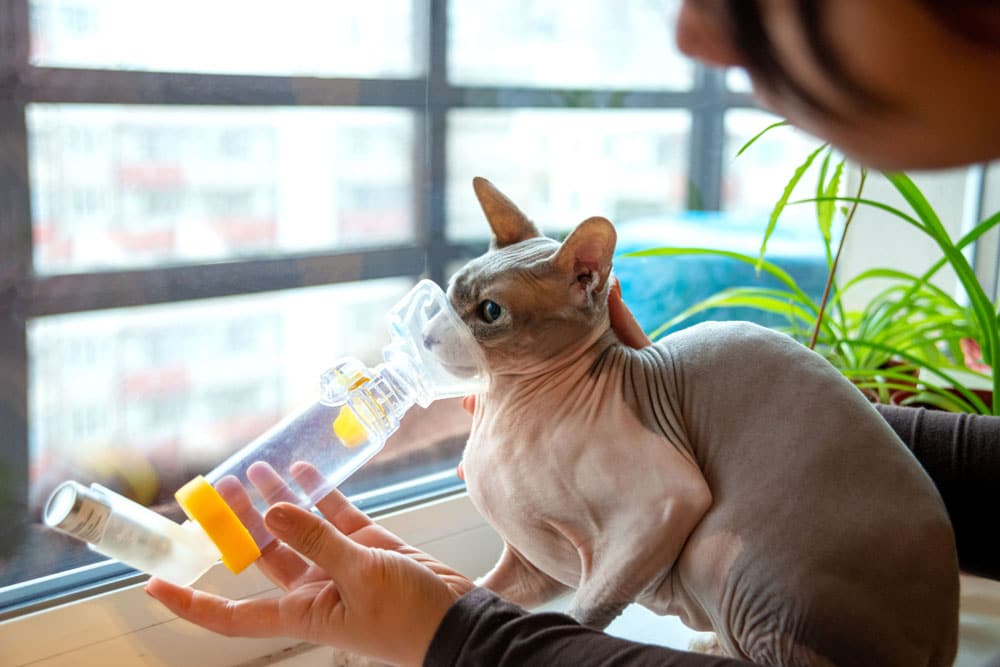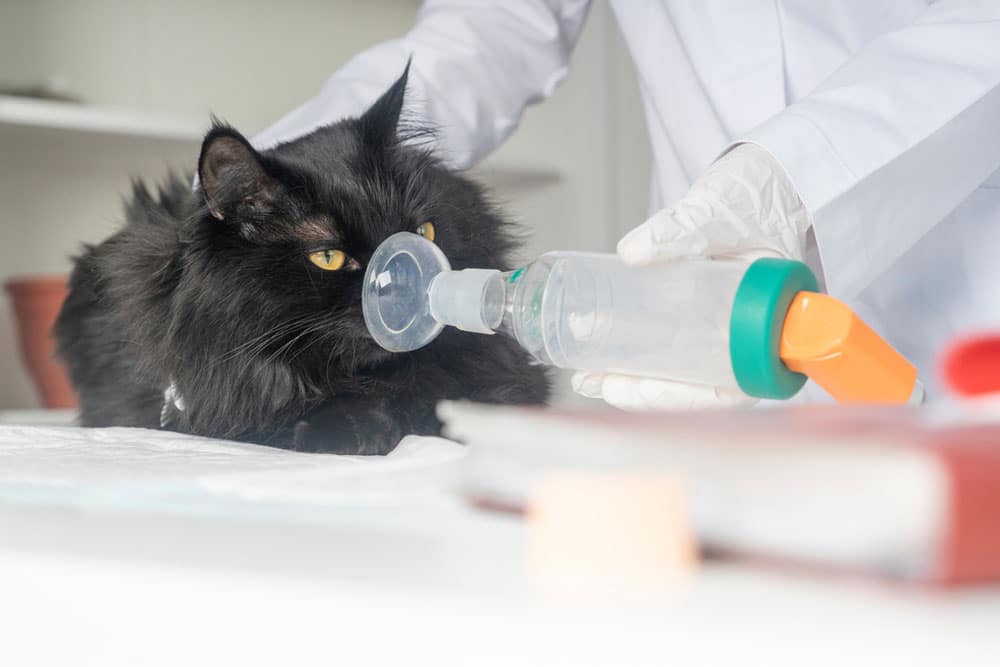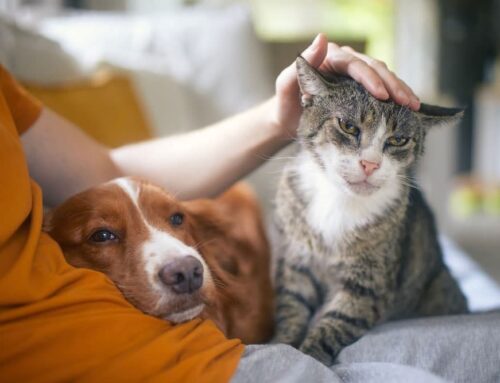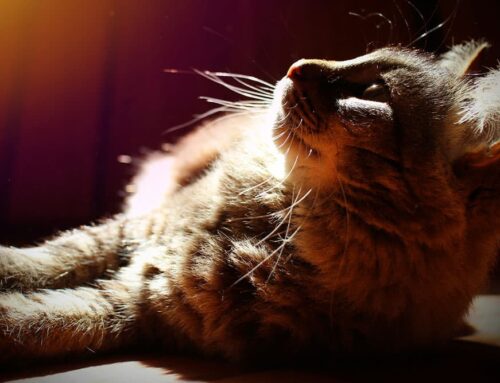Feline Asthma: Recognizing, Managing, and Supporting Your Cat’s Breathing Health
Feline asthma is a chronic inflammatory condition affecting the airways, causing difficulty breathing, coughing, and wheezing. While it can develop in cats of any age, it is more commonly diagnosed in middle-aged and senior cats. Left untreated, asthma can significantly impact a cat’s quality of life and, in severe cases, become life-threatening.
At Mobile Cat & Dog Vet in Bend, Oregon, we specialize in providing compassionate, in-home veterinary care, including support for cats with chronic conditions like asthma. Understanding the symptoms, causes, and treatment options can help cat owners manage this condition effectively, ensuring their cat remains comfortable and healthy.
What Is Feline Asthma?
Feline asthma is similar to human asthma in that it is an allergic reaction that causes airway inflammation. When a cat inhales an irritant, the immune system overreacts, leading to:
- Airway constriction (narrowing of the bronchi)
- Inflammation and mucus buildup
- Difficulty breathing and coughing
Over time, repeated flare-ups can permanently damage the lungs, making early diagnosis and management crucial.
For an in-depth look at feline asthma, visit Cornell Feline Health Center’s guide.
Signs and Symptoms of Feline Asthma
Asthma symptoms can range from mild to severe, with some cats experiencing occasional flare-ups and others having persistent respiratory distress.
Common Signs of Asthma in Cats:
- Coughing or hacking (often mistaken for hairballs)
- Wheezing or noisy breathing
- Labored or rapid breathing (more than 40 breaths per minute at rest)
- Open-mouth breathing or gasping for air
- Lethargy or reduced activity
- Cyanosis (bluish gums or tongue, indicating oxygen deprivation)
If your cat shows signs of respiratory distress, seek immediate veterinary attention. Learn more about respiratory distress in pets from AAHA.
What Causes Feline Asthma?
Asthma in cats is triggered by environmental allergens and irritants. Common causes include:
- Dust and pollen
- Cigarette smoke
- Household cleaners and aerosols
- Scented cat litter
- Mold and mildew
- Cold air or seasonal changes
Some cats may also experience flare-ups due to stress, making a calm, stable environment essential for asthma management.
Diagnosing Feline Asthma
Since asthma symptoms can mimic other respiratory conditions, a thorough veterinary evaluation is necessary for an accurate diagnosis.
Diagnostic Tests May Include:
- Physical Exam – Listening to the lungs and evaluating breathing patterns.
- Chest X-rays – Identifies airway inflammation or lung changes.
- Bloodwork – Rules out infections or underlying diseases.
- Bronchoalveolar Lavage (BAL) – A procedure to collect lung fluid for analysis.
Other conditions, such as heart disease, lung infections, and feline upper respiratory infections, can cause similar symptoms. Read more about upper respiratory infections in cats from ASPCA Pro.
Treatment Options for Cats with Asthma
There is no cure for feline asthma, but it can be effectively managed with long-term treatment and environmental modifications.
1. Inhaled Medications (Preferred Treatment)
Just as with human asthma, inhalers provide targeted medication directly to the lungs.
- Corticosteroids (e.g., Fluticasone) – Reduces inflammation in the airways.
- Bronchodilators (e.g., Albuterol) – Helps open airways during an asthma attack.
The AeroKat inhaler system is commonly used for feline asthma. Learn more about how to use AeroKat for administering inhaled medications.
2. Oral or Injectable Steroids
For cats that cannot tolerate inhalers, oral steroids such as prednisolone may be used. However, long-term steroid use can have side effects, including:
- Increased thirst and appetite
- Weight gain
- Diabetes risk in senior cats
3. Environmental Changes
Reducing exposure to allergens can decrease asthma flare-ups. Consider:
- Using low-dust, unscented cat litter
- Avoiding air fresheners, candles, and perfumes
- Keeping your home dust-free with frequent cleaning
- Using HEPA air purifiers to remove airborne allergens

Managing Feline Asthma in Senior and Palliative Care Cats
Asthma can be particularly challenging for senior cats, as it often coincides with other age-related conditions like kidney disease and arthritis. Senior cats may have:
- Weaker immune systems, making them more prone to respiratory infections.
- Reduced lung function, making asthma symptoms more severe.
- Increased sensitivity to medications, requiring careful dosage adjustments.
For guidance on managing chronic conditions in older cats, visit Cornell’s resource on chronic kidney disease.
Palliative Care Considerations
For cats with advanced asthma and multiple health conditions, a palliative approach may be the best option. This includes:
✔ Focusing on comfort and quality of life
✔ Using inhaled medications to minimize systemic side effects
✔ Providing a stress-free environment
✔ Offering gentle respiratory support when needed
Our mobile veterinary services allow us to provide in-home care, reducing stress for cats with chronic respiratory conditions.
When to Seek Emergency Veterinary Care
While many asthma cases are manageable at home, some situations require immediate medical attention.
Signs of a Life-Threatening Asthma Attack:
- Open-mouth breathing or severe gasping
- Extreme lethargy or collapse
- Bluish gums or tongue (cyanosis)
- Continuous coughing that does not stop
If your cat is experiencing severe respiratory distress, contact an emergency veterinarian immediately.
Personalized Asthma Care with Mobile Veterinary Services
Caring for a cat with asthma requires consistent monitoring and a personalized treatment plan. At Mobile Cat & Dog Vet, we provide in-home veterinary care for cats with chronic conditions, offering:
- Comprehensive asthma evaluations
- At-home inhaler guidance and training
- Senior and palliative care support
Have questions about your cat’s breathing? Contact us for expert advice.
Need an at-home veterinary visit? Request an appointment today.








Leave A Comment